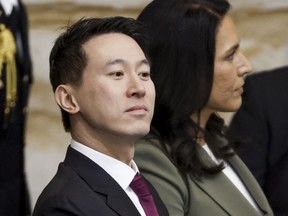
Article content
OTTAWA — The chief executive of TikTok is asking Industry Minister Melanie Joly for an urgent meeting about the federal government’s order directing the company to shut down its Canadian operations.
THIS CONTENT IS RESERVED FOR SUBSCRIBERS ONLY
Subscribe now to read the latest news in your city and across Canada.
- Exclusive articles from Barbara Shecter, Joe O'Connor, Gabriel Friedman, and others.
- Daily content from Financial Times, the world's leading global business publication.
- Unlimited online access to read articles from Financial Post, National Post and 15 news sites across Canada with one account.
- National Post ePaper, an electronic replica of the print edition to view on any device, share and comment on.
- Daily puzzles, including the New York Times Crossword.
SUBSCRIBE TO UNLOCK MORE ARTICLES
Subscribe now to read the latest news in your city and across Canada.
- Exclusive articles from Barbara Shecter, Joe O'Connor, Gabriel Friedman and others.
- Daily content from Financial Times, the world's leading global business publication.
- Unlimited online access to read articles from Financial Post, National Post and 15 news sites across Canada with one account.
- National Post ePaper, an electronic replica of the print edition to view on any device, share and comment on.
- Daily puzzles, including the New York Times Crossword.
REGISTER / SIGN IN TO UNLOCK MORE ARTICLES
Create an account or sign in to continue with your reading experience.
- Access articles from across Canada with one account.
- Share your thoughts and join the conversation in the comments.
- Enjoy additional articles per month.
- Get email updates from your favourite authors.
THIS ARTICLE IS FREE TO READ REGISTER TO UNLOCK.
Create an account or sign in to continue with your reading experience.
- Access articles from across Canada with one account
- Share your thoughts and join the conversation in the comments
- Enjoy additional articles per month
- Get email updates from your favourite authors
Sign In or Create an Account
or
Article content
Shou Chew wrote to Joly on July 2 asking for an in-person meeting within two weeks, according to a letter obtained by The Canadian Press.
Article content
Article content
Chew argued that order was made in different circumstances, when it looked like the United States was going to ban TikTok.
Article content
Article content
“There is no upside to this outdated and counterproductive government order, which was issued under a different government and in a different era, and which doesn’t reflect today’s reality,” the letter says.
Article content
By signing up you consent to receive the above newsletter from Postmedia Network Inc.
Article content
In November, Ottawa ordered the dissolution of TikTok’s Canadian business following a national security review of ByteDance Ltd., the Chinese company behind the social media platform.
Article content
While TikTok has been told to wind down its Canadian operations, the app will continue to be available to Canadians.
Article content
Chew argued going ahead with that November directive would make Canada an outlier among its allies, including other countries that are part of the Five Eyes intelligence-sharing alliance.
Article content
He said the order appeared to be based on “assumptions about TikTok’s future in the United States which no longer hold true.”
Article content
Canada launched its national security review in the fall of 2023 but did not disclose it until March 2024, when the U.S. House of Representatives passed a bill to ban TikTok if ByteDance did not divest its stake.
Article content
But in June, U.S. President Donald Trump extended the deadline to ban TikTok in the U.S. for a third time.
Article content
Article content
In the July 2 letter, Chew said that without Joly’s intervention, the company would soon have to fire more than 350 employees in Canada, stop its direct investment in Canada and cut support for Canadian creators and culture.
Article content
Read More
-

ByteDance weighs non-sale options for TikTok
-

TikTok CEO joins Trump’s inauguration
Advertisement embed-more-topic
Article content
“The wind-up process is rapidly approaching a critical juncture,” he wrote.
Article content
On July 7, TikTok said it was pulling out as a sponsor of several Canadian arts institutions, including the Juno Awards and the Toronto International Film Festival.
Article content
A spokesperson for Joly did not answer questions about whether the minister has responded to the letter or plans to meet with Chew.
Article content
TikTok is challenging the shutdown order in Federal Court. It launched a legal challenge in December, arguing the government ordered “measures that bear no rational connection to the national security risks it identifies.”
Article content
Ottawa’s national security review was carried out through the Investment Canada Act, which allows the government to investigate any foreign investment with the potential to harm national security.
Article content
When he was industry minister, Francois-Philippe Champagne said the government was taking action to address “specific national security risks.” He didn’t specify what those risks are.

.jpg) 4 hours ago
1
4 hours ago
1


 English (US)
English (US)